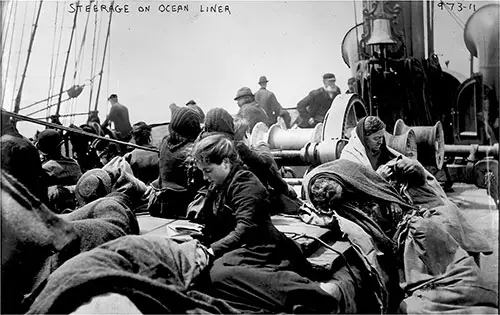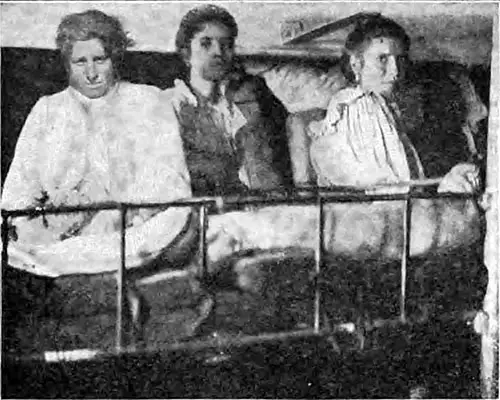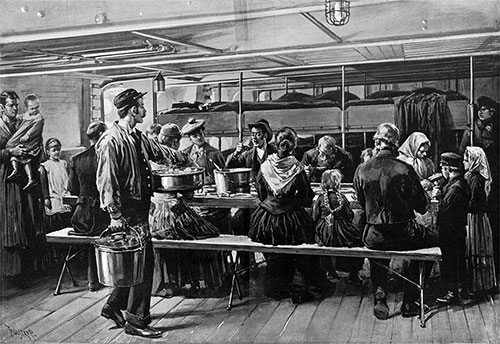Treatment of Women in Steerage - 1909

Steerage Passengers on Deck of Ocean Liner - 11 March 1897. Bain Collection, Library of Congress # 2014684540. GGA Image ID # 145f9f3609
WOMEN IN STEERAGE - GROSSLY ILL USED
Government inspectors Declare Male Passengers and Crew Invade Their Quarters.
NONE SAFE FROM INSULT
Report Which Has Reached Senate Asks Legislation to Improve Appalling Conditions,
WASHINGTON, Dec. 13, 1909.
A report on steerage conditions, based on information obtained by special agents of the Immigration Commission traveling as steerage passengers on different transatlantic steamers, was made public today through a presentation to the Senate with recommendations for legislation to better conditions. Conditions found on many of these vessels are described as appalling.
Even though, In some Instances, steamship owners obeyed the letter of the law Implicitly.
The general report of the commission contains the stories of Individual agents giving their experiences on board steamships where they posed as steerage passengers. Summing up one such trip, a woman agent of the Immigration Commission, who was herself miserably suited, said:
"During these twelve days In the steerage, I lived In a disorder and in surroundings that offended every sense. Only the fresh breeze from the sea overcame the sickening odors."
"The vile language of the men, the screams of the women defending themselves, the crying of children, wretched because of their surroundings, and practically every sound that reached the ears Irritated beyond endurance. There was no night before which the eye did not prefer to close.
"Everything was dirty, sticky, and disagreeable to the touch. Every impression was offensive. Worse than this was the general air of immorality."
"For fifteen hours each day, I witnessed all around me this Improper, indecent, and forced mingling of men and women who were total strangers, and often did not understand one word of the same language. People cannot live with such surroundings and not be influenced."
Agents of the Immigration Commission say that on many of the steamships, male stewards and members of the crew, as well as male steerage passengers, crowd into the compartments set aside for women and continuously pass through the passageways of such chambers so that no woman in the steerage had a moment's privacy."
The women agents of the commission say that the women's compartments in which they were quartered had but one entrance and exit so that there could be no reasonable excuse for the constant appearance of the men.
It is stated that during the hour preceding the breakfast bell, while the women are rising and dressing, several men usually pass through and return for no ostensible reason.
"If a woman were dressing," says one woman agent, "they always stopped to watch her and frequently hit and handled her.
"One night, when I had retired very early with a severe cold, the chief steerage steward entered our compartment and approached a Polish girl who was apparently the only occupant. She spoke In Polish, saying: 'My head aches; please go on and let me alone.'
The girl, weakened by seasickness, defended herself as best she could but soon struggled to get out of the man's arms. Just then, another passenger entered, and he released' her; 'Such was the man who was our highest protector and court of appeal."
Describing further how women steerage passengers were compelled to submit to insults, the report says that the passage just referred to the fact that not one young woman In the steerage escaped such experiences.
The writer herself was no exception and told of repelling advances on the part of the crew and stewards with a hard, unexpected blow in the offender's face.
Concerning other conditions in the old type of steerage, which still exists on many steamships, the commission's agents are just as severe. In the introduction to the report, it is stated:
"The universal human needs of space, air, food, sleep, and privacy are recognized to the degree now made compulsory by law. Beyond that, the persons carried are looked upon as so much freight, with mere transportation as their only due."
Sleeping Quarters

Upper Bunks in the Women's Compartment Showing the Life-Preserver Pillows. Leslie's Monthly Magazine, May 1904. GGA Image ID # 1461ac12d2
The sleeping quarters are described as being, in many cases, dirty, inadequate, and all that is bad. The average berth is six feet long and two feet wide, with only two and one-half feet of space above it, and that Is all the space to which the passenger can assert a definite right.
In that space, he has to sleep and find room for his baggage, all his extra clothing, his eating utensils, his towels, and other toilet necessities. The passageways between the bertha are so narrow that none of the articles mentioned could be deposited there.
The floors are continually damp when made of iron, and when made of wood, they are not washed. The open deck available to the steerage is described as very limited.
Much space is devoted to the lack of ventilation and adverse washroom conditions. On some ships, men and women steerage passengers are obliged to use in common.
Dining Rooms

Dinner is Being Served to Steerage Passengers on a French Line Steamship circa 1890. Note the Racks of Bunk Beds in the Background where the Steerage Passengers Slept. Harper's Weekly Supplement, 22 November 1890. GGA Image ID # 145c2d6def
Regular dining rooms are not a part of the old-type steerage. On such ships, none of the men have places to sit for their meals, and provision is not made for all women. The food served is described as fair in quality but usually spoiled by being wretchedly prepared.
Suitable conditions are described In connection with investigations of some steamships. It is declared that competition was the most effective influence that led to the developing of an improved type of steerage.
It is declared, however, that a division of the territory from which the several transportation lines draw their steerage passengers excludes the possibility of the use of this force for further extension of the new type of steerage to all Immigrant-carrying lines, Legislation Is advocated to complete what competition began.
New Statutes
The new statutes, which It was supposed would obviate dirt and provide ventilation for steerage passengers, took effect on 1 January of the current year (1909).
The government can demand that the vessels fitted with the new steerage, in the opinion of agents of the Immigration Commission, fully comply with all that under the law.
On that account, it is urged that a statute be enacted to place government officials, both men, and women, on vessels carrying third class and steerage passengers, the expense to be borne by the steamship companies.
Under existing conditions on some steamships where the old type steerage prevails, the report says, a woman can't keep even reasonably clean. Of this condition, one agent says:
"No woman with the slightest degree of modesty, and with no other conveniences than a washroom, used jointly with men, and faucet of cold salt water, can keep clean amid such surroundings for twelve days and more.
It was forbidden to bring water for washing purposes into the sleeping compartments, nor was there anything in which to carry it. On different occasions, some women rose early and brought drinking water in their soup palls for washing but were driven out when detected by a steward. No soap and no towels were supplied."
Senator Dillingham, Chairman of the Immigration Commission, Introduced In the Senate today two bills Intended to correct much of the evil of which complaint is made.
"Women in Steerage Grossly Ill Used," in the New York Times, 14 December 1909, Page 3, Column 2.
